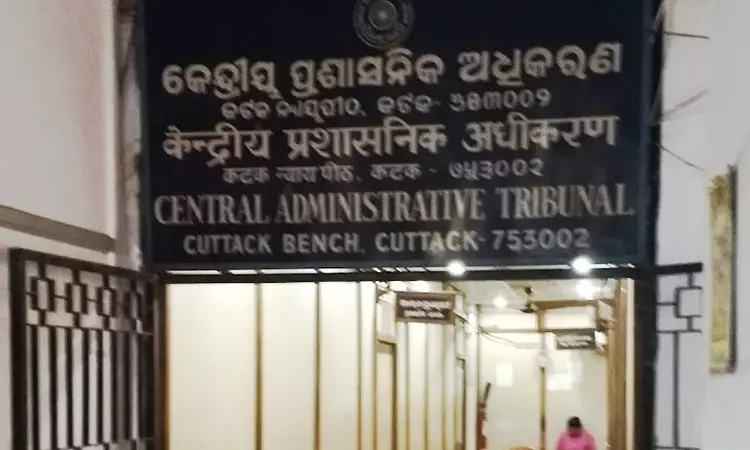- Home
- /
- Labour & Service
- /
- Payment Of Salary Or Pension Is...
Payment Of Salary Or Pension Is Unexceptionable, Is Integral Aspect Of Article 21 & Article 300A Of Employees Or Ex-Employees: Central Administrative Tribunal Cuttack
Rajesh Kumar
7 May 2024 2:00 PM GMT
The Central Administrative Tribunal Cuttack bench of Sudhi Ranjan Mishra (Judicial Member) and Pramod Kumar Das (Administrative Member) held that the payment of salaries and/or pension is unexceptionable. Salaries represent compensation for services rendered by employees and are thus rightfully due to them. The Tribunal emphasized that the entitlement of an employee or former employee...
The Central Administrative Tribunal Cuttack bench of Sudhi Ranjan Mishra (Judicial Member) and Pramod Kumar Das (Administrative Member) held that the payment of salaries and/or pension is unexceptionable. Salaries represent compensation for services rendered by employees and are thus rightfully due to them. The Tribunal emphasized that the entitlement of an employee or former employee to their salary or pension constitutes an integral aspect of their fundamental rights, including the right to life under Article 21 and the right to property under Article 300 A of the Constitution.
Brief Facts:
The matter pertained to a dispute regarding the mode of salary payment for the applicant, a Postal Assistant stationed at Station Road, Jhalsuguda SO. In a letter dated 21.11.2019, the employer advised the applicant to open a POSB account for the credit of his salary for the months of February to April, 2019, contrary to his request to have his salary credited to his SBI account. The applicant alleged that the non-credit of his salary during this period was approached the Central Administrative Tribunal Cuttack (“Tribunal”) and filed an original application seeking to direct the employer to credit his withheld salary with 18% interest.
The applicant argued that he was receiving his salary through his SBI account since 2014. However, the employer began crediting his salary into his POSB account from July 2018 without his consent. The applicant objected to this and formally requested on 09.02.2019 for his salary to be credited to his bank account. Subsequently, he closed his POSB account. Despite his repeated pleas to higher authorities, his salaries for the months of February, March, and April 2019 were not paid into his bank account. The applicant's spouse also filed a complaint on the Centralized Public Grievance Redress and Monitoring System but didn't receive any satisfactory response.
On the other hand, the employer contended that as per departmental directives, employees including the applicant were instructed to open POSB accounts for salary credit. The applicant's salary was consistently credited to his POSB account since July 2018. Despite the applicant's application to credit his salary to his SBI account, technical constraints such as the requirement of a "Bank key" and software limitations hindered the process. Furthermore, it argued that the applicant intentionally closed his POSB account on 26.02.2019, complicating the salary disbursal process. It maintained that it repeatedly instructed the applicant to open a POSB account for the withheld salary, but the applicant did not comply. Consequently, it argued that it cannot be held responsible for the non-credit of the salary.
Observations by the Tribunal:
The Tribunal held that the applicant was not paid his salary for the months of February to April 2019, despite being lawfully entitled to it. The employer attributed this non-payment to the absence of a POSB account, although it later acknowledged that the applicant's salary from May 2019 onwards was credited to his bank account. The Tribunal held that the Payment of salaries and/or pension is unexceptionable, and salaries are due to the employee for the service rendered. Thus, it held that entitlement of an employee or an ex-employee to his salary or pension, as the case may be, is an intrinsic part of his right to life under Article 21 and right to property under Article 300 A of the Constitution. It expressed astonishment at the non-payment of the applicant's salary despite his service, especially when subsequent salaries were credited to his bank account.
The Tribunal noted that in cases where salaries are withheld and subsequently released, employees are generally allowed to choose the account for crediting. Additionally, the Tribunal pointed out that even in cases of an employee's demise, arrear salaries are paid to legal heirs in alternative accounts. The Tribunal found it perplexing that the employer relied on the absence of a POSB account as a pretext for non-payment, especially when subsequent salaries were credited to the applicant's bank account.
Therefore, the Tribunal held that the non-payment of salary for the period from February to April 2019 was highly illegal and arbitrary. Acknowledging the admitted position that payment was not made on the due date and that there were no disputed facts involved, the Tribunal held that the applicant was entitled to his salary. Further, the Tribunal directed the employer to pay the salary and simple interest at a rate of 6% per annum on account of deferred salaries within 30 days.
Case Title: Shushil Kumar Senapati vs Union of India and Ors.
Case Number: O.A.No. 260/00336 of 2020
Advocate for the Applicant: Mr. C.P.Sahani, Counsel
Advocate for the Respondent: Ms. S.B.Das, Counsel


